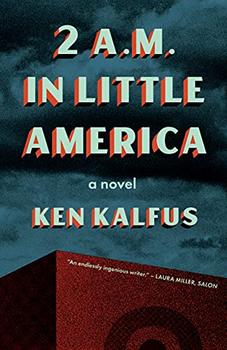Summary | Excerpt | Reviews | Beyond the Book | Readalikes | Genres & Themes | Author Bio

Critics' Opinion:
Readers' Opinion:
First Published:
May 2022, 256 pages
Paperback:
Sep 2022, 256 pages
 Book Reviewed by:
Book Reviewed by:
Elisabeth Herschbach
Buy This Book
I bought a bicycle, which I used to make service calls in all weather. A car was well out of my reach, as it was for most migrants who were not involved in criminal activity. Many were. Reunited in exile, the former militiamen now operated off-the-books enterprises, like moving drugs and running casinos, which seemed like the enclave's most viable businesses. I'd see the men descending from their sports utility vehicles, often accompanied by security escorts. They paid no attention to me as I biked past and I made an effort to show that I wasn't paying attention to them, and that in fact I hadn't seen them at all.
The national government to some extent also ignored the former fighters and their new vocations, seemingly content with its limited writ in the enclave. Officials didn't mind that a few vendettas had been carried over from the States and that the former militias remained intensely competitive, as long as everything was kept among the Americans. I presumed some payoffs were involved, but obviously this was none of my business.
***
My job satisfied me, even if my work was now conducted mostly underground. Every balky control unit represented a unique puzzle, a gratifying intellectual challenge that I was good at solving. I liked bicycling through the enclave. It was colorful and lively and intensely American, though anything resembling these particular streets and structures would never have been found in the States. I came to know some residents and their children. They recognized my company uniform and welcomed my presence as something official and benign, a rare combination in the enclave, where there was no mail delivery and few other public services. I waved at the children with my flashlight.
Sometimes the kids only stared and I wondered if they were reporting my itinerary to the militias, who I supposed kept close tabs on what was happening within the district. I thought I could sense this surveillance, even though it was very surreptitious, and close to imperceptible, and possibly a figment of my imagination. Some buildings I entered were controlled by one gang or another. A few streets were no-go areas for the other gangs. So people could have been interested in my travels, what I saw, what I knew. I could not be sure how I was being watched, but the surveillance was not a figment, I thought with some confidence, or at least with as much confidence as I could ever muster—no less aware, after these many years of dislocation, that I was susceptible to impossible fancies and radical uncertainty.
From time to time I was sent outside the enclave to inspect rooftop equipment in the downtown business district, which had recently become the continent's most important financial capital. Audacious new construction dwarfed the pretensions of the other cities in which I had lived. Whole neighborhoods had been razed and rebuilt and they were now serviced by sleek, superfast public transport, stylish bistros, and high-end retail shops. Sharp-looking businesspeople from all over the region flooded the granite sidewalks. In the new skyscrapers aerodynamically advanced elevators zoomed me more than a hundred stories above the landscape, where the enclave was barely discoverable among the city's outlying territories.
Recalling an earlier architectural style, the new buildings were walled by towering sheets of glass, some of it highly reflective. Decorative and artistic objects in the plazas, situated around perfectly still wading pools, were surfaced in stainless steel. Some objects were concave-shaped, others convex, fabricated with a variety of focal lengths. The result for the observer, walking determinedly from one corporate complex to the other, was a cacophony of reflected images, some of them distorted or unexpectedly located, chunks of sidewalk or passing buses flying above his head or patches of sky scurrying by his feet.
Excerpted from 2 A.M. in Little America by Ken Kalfus. Copyright © 2022 by Ken Kalfus. Excerpted by permission of Milkweed Editions. All rights reserved. No part of this excerpt may be reproduced or reprinted without permission in writing from the publisher.





The Funeral Cryer by Wenyan Lu
Debut novelist Wenyan Lu brings us this witty yet profound story about one woman's midlife reawakening in contemporary rural China.
Your guide toexceptional books
BookBrowse seeks out and recommends the best in contemporary fiction and nonfiction—books that not only engage and entertain but also deepen our understanding of ourselves and the world around us.